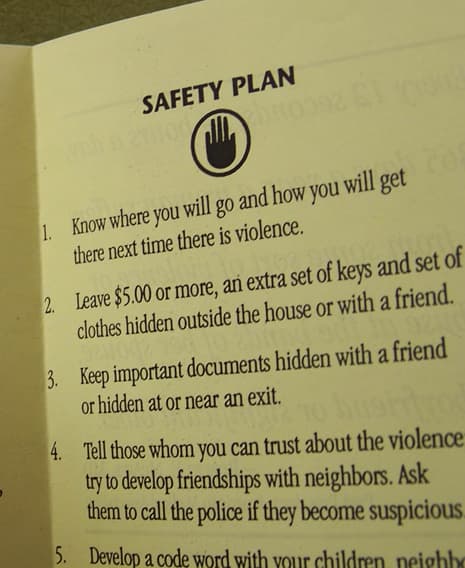- Home
- Domestic Abuse
- Leaving an Abusive Relationship
Leaving an Abusive Relationship - Getting Prepared
If you are in an abusive relationship and are considering separation or divorce, you need to proceed carefully.
Your abuser may react very strongly to your leaving, so you need to be prepared before announcing your plans. You also need to realize that an abusive husband will be prone to using control and scare tactics to get you to concede to a less than desirable divorce settlement.
The following article outlines some of the things to keep in mind when you're considering leaving your abusive relationship.
Separating from an Abusive Partner
by Gary Direnfeld, MSW, RSW
If you are in an abusive relationship and are seeking to separate or divorce from your partner, your safety may be at risk and your ability to achieve a reasonable separation agreement may be compromised.
Characteristics of Controlling Behavior
Abusive relationships are characterized by one party seeking power and control over the other party. Sometimes, the objective of power and control is the power and control itself. To some persons, this alone is gratifying. To other persons, the power and control is a means to obtain their needs and wants either ahead of or in lieu of their partner.
The strategies or tactics of the persons seeking power and control over the other include manipulation and mind games, coercion, threats and intimidation, and varying degrees of violence. The control can be exercised against the partner directly or indirectly through the children, by threatening to harm loved ones and evening threatening to hurt pets or by destroying your possessions. At times, the risk of harm may be self-directed as in the threat of suicide while at the same time holding you hostage through guilt.
Abuse May Increase When You Leave
Typically when exiting a relationship, the person lording power and control over the other will escalate their tactics out of fear of losing their grip on the one leaving. As such, where there may not have been a display of violence before, the first episode may erupt when seeking departure. Where violence has been a feature of the relationship, the severity or intensity or dangerousness may escalate at this point too.
Power and control tactics are designed to instill fear or guilt in the partner through which the abusive party gets their way. These tactics are powerful and can fully immobilize their victim. In some cases the victim’s concern for their mental and physical well-being is very real and as such, victims learn to exercise extreme caution, so as not to set off their abusive partner. Hence, these persons learn to walk on eggshells, are very mindful of their own behavior as well as their partner’s mood and act so as to avoid raising issues that may increase risk.
Have a Plan Before You Leave

The first objective in a departure from an abusive situation is your safety and that of your children. To leave safely, it is necessary to plan first.
The first step in planning is finding supports. A support is a service or persons you can trust and turn to for help with departure. Many communities have shelters or counseling services where you can go to discuss your situation and get help to develop a plan for leaving.
If you cannot go in person, phone and talk with a worker. Be careful about emails if there is a concern that your abusive partner may access your email records and learn of your plan.
If a community service is not available, consider contacting your clergy or physician. Your local police and even your local child protection agency may be able to direct you to appropriate services or may help you directly with your plan.
After you have departed and you are in a safe place, then you may consider achieving a settlement agreement. A settlement agreement spells out how your mutual assets will be divided and if there are children between you, how you and your partner will continue to care for the children and what financial supports may be forthcoming.
Get Help With Your Settlement Agreement
If you are seeking to achieve a settlement agreement with an abusive partner, it is more than likely that you will need specific support here too. You must act with concern for safety. Further, the risk when trying to achieve a settlement on your own is that you may give up too much out of fear or guilt or for the purpose of achieving peace at any cost. When one person gains more than the other in a settlement, these are known as lop-sided agreements. A lop-sides agreement may leave you with too few resources to manage for yourself or children. Further, a lop-sided agreement may provide un-safe access to children in view of an abusive partner.
Regardless of you method or achieving a settlement agreement, chose a service provider, whether a lawyer, mediator, arbitrator or social worker, with specific expertise in abuse issues to help you through the settlement process. Your service provider should ask about abuse issues and your safety. If your service provider doesn’t ask, this may be a sign that this person is not equipped to provide necessary support and you may be better off finding another service provider.
Leaving an abusive relationship requires appropriate supports. Your safety and that of children comes first.
Quote of the Day
If you can’t be thankful for what you have, be thankful for what you have escaped - Unknown
If you are in an abusive relationship, check out this Women Safety Domestic Violence overview from crime-safety-security.com.
Below, you can find more articles that deal with other aspects leaving of an abusive relationship:
Questions About Restraining Orders
